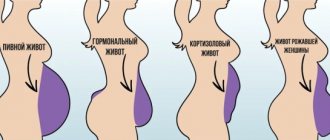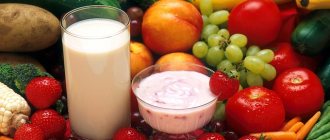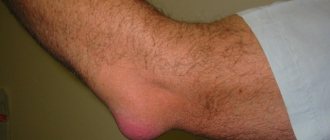What is overeating
By this term, doctors mean an eating disorder in which a person consumes a large amount of food in a short period of time without controlling his actions.
This condition is also commonly called gluttony. Its peculiarity is that a person consumes food in excessive quantities, even when he does not experience physical hunger. Preference is given to sources of fats and carbohydrates, which lead to weight gain.
Degrees
Incontinence in eating is characterized by several degrees:
- mild - rare episodes of overeating (most often during holiday feasts, when there are a lot of dishes on the table and you want to try everything);
- medium - bouts of gluttony occur several times a month;
- heavy (extreme) - regular consumption of food in unlimited quantities.
How to Stop Overeating Tip 1: Develop a Healthier Relationship with Food
Recovery from any addiction is challenging, but overeating and food addiction can be especially difficult to overcome. Unlike other addictions, your “medicine” is necessary for survival, so you have no option to avoid or replace it. Instead, you need to develop a healthier relationship with food. A relationship based on meeting your nutritional needs, not your emotional needs. To do this, you must break the cycle of overeating.
Avoid temptation. You are more likely to overeat if you have junk food, desserts, and unhealthy snacks in your home. Eliminate temptation by clearing your refrigerator and cabinets of your favorite snacks.
Listen to your body. Learn to differentiate between physical and emotional hunger. If you've eaten recently and your stomach hasn't rumbled, you're probably not very hungry. Allow the craving time to pass.
Eat regularly. Don't wait until you are very hungry. This only leads to failure! To stop overeating, stick to planned meals, as skipping meals often leads to overeating later in the day.
Don't avoid fat. Contrary to what you might think, dietary fat can actually help you stop overeating and gaining weight. Try to include healthy fat in every meal to help you feel satisfied and full.
Fighting boredom. Instead of snacking when you're bored, distract yourself. Take a walk, call a friend, read, or take up a hobby such as painting or gardening.
Focus on what you eat. How often have you eaten in an almost trance-like state, without even enjoying what you were consuming? Instead of eating mindlessly, be a mindful eater. Eat slowly and enjoy the textures and flavors. Not only will you eat less, you'll enjoy it more.
Types of disorder
Nutritionists distinguish several types of eating disorders.
Compulsive
This type of overeating is characterized by constantly repeated episodes of consumption of food in unlimited quantities. Attacks occur against a background of boredom, depression, psychological complexes and trauma.
Compulsive overeating occurs due to boredom.
A person prefers to eat alone to hide his strong appetite.
After an episode of binge eating, he experiences shame and guilt, and begins to hate and berate himself.
Unconscious seizures
Unconscious overeating is eating on autopilot, when a person is not aware that he needs to stop. This happens when he mechanically finishes a pack of cookies while sitting at the computer or, out of habit, goes to the kitchen to make himself a few more sandwiches while a commercial is on TV.
External
With external overeating, it is difficult to resist trying the food nearby. A person is unable to pass by fragrantly smelling baked goods in a store. Finding himself in a group of friends who are eating, he will definitely join them, even if he has recently had lunch.
With external overeating, a person is unable to pass past baked goods.
Emotional
With this eating disorder, people overeat while in a state of emotional arousal. Food becomes their main comforter, helping them cope with anxiety, resentment and other negative feelings.
Restrictive
This type of gluttony is typical for strict diets. Denying themselves their favorite dishes and constantly feeling hungry, people begin to constantly think about food.
Restrictive gluttony is typical of strict diets.
Tired of restrictions, a person breaks down and attacks the food that he has denied himself for a long time. After this, he feels guilty and begins to lose weight again until another breakdown occurs.
Because of this diet, restrictive overeating becomes regular.
Your dopamine levels rise
It's no secret: food makes you feel great. The point is not only that it is tasty and provides satiety, there is also an effect on the hormonal level. Your body produces dopamine, the feel-good hormone.
The Himalayas should be a nature reserve, experts say
From July 1, the import of right-hand drive cars of categories M2 and M3 is prohibited
The Ministry of Health has approved the drug Areplivir for COVID-19: a treatment regimen has already been developed
Sugary, fatty foods provide you with the highest levels of dopamine, which is why people tend to overeat chips or cakes rather than healthy salads. The need for constant hormone surges is what causes the development of addiction.
Causes of overeating
The inability to cope with insatiable food cravings occurs for various reasons. They are divided into several groups.
Physiological
Physiological factors that provoke excessive food consumption include:
- Slow transmission of saturation signal. The brain “reports” that the stomach is full 20 minutes after starting a meal. Because of this feature of the body, people who are accustomed to eating quickly eat much more than required.
- Stretched stomach walls. It should hold no more than 0.5 liters of food. When a person regularly overeats, the stomach stretches and requires more food.
- Disturbance in the functioning of the hypothalamus. This part of the brain is responsible for the feeling of fullness. If there is a malfunction in its functioning, a person may constantly experience increased appetite and not be full.
- False feeling of hunger. It occurs when the body does not have enough water, vitamins or minerals.
Delayed transmission of the satiety signal provokes increased food consumption.
Psychological
Psychology also identifies reasons that lead to gluttony:
- Loneliness. When it is not possible to find a partner for a long time, a person stops taking care of himself and begins to compensate for dissatisfaction with his personal life by eating large meals.
- Low self-esteem. People with complexes tend to indulge in delicious food in order to think less about their own worthlessness.
- Depression. When a person withdraws into himself, he does not notice how he eats more than he should.
- Trouble, stress. When faced with problems, many try to “seize” them.
- Achievement Award. Some people like to reward themselves with treats.
Social
Social factors can also turn a person into a glutton:
- The influence of advertising. The taste preferences of society are formed under the influence of advertising, which imposes harmful products that cause food addiction.
- Lack of time. Due to constant busyness, people do not have time to have a full breakfast and lunch. In the evening, when they have free time, they eat to their fill.
- Changing food requirements. Today, healthy products are fading into the background, giving way to inexpensive fast food (convenience foods, pasta, sausage). It contains many chemical additives that cause cravings for unhealthy and high-calorie foods.
Due to lack of time, people do not have time to eat properly.
You develop physiological dependence
You might think that increased dopamine levels are a good thing, but in reality, moderation is key. If the level is always high, you need more and more food, you want to eat more and more often, otherwise you simply do not get the desired effect. If before it was enough for you to eat one cookie, then you will need five. Like any addiction, overeating is accompanied by a loss of strength when you feel weak, trembling, and increased sweating. A chemical reaction develops in your brain that causes you to behave in the same way as if you were addicted to drugs or alcohol. In the process, you begin to suffer emotionally, which does not allow you to deal with the problem and only aggravates it.
An owl sleeping on its stomach was photographed: people didn’t believe it, but scientists confirmed it
Coronavirus in cinema - experts have named a possible date for the opening of cinemas
First they were asked to make a pair of mirrors: works by Simone Crestani and Roberto Reed
Mistakes that cause overeating
Quitting smoking can lead to gluttony.
This is explained by the fact that the smoker tries to compensate for the lack of cigarettes with food. As a result, he stops smoking, but gets used to eating foods in immoderate quantities. Filling the vacuum left by quitting cigarettes with food is a big mistake. To avoid it, experts advise people who quit smoking to devote more time to useful activities that will help them not think about cigarettes.
Another mistake that leads to eating disorders is the inability to refuse a treat when visiting.
A man eats everything that is put on his plate, for fear of offending the mistress of the house. But the desire to be polite works against him, so you always need to be able to say “no” when your stomach is full.
Dietary ways to get rid of evening overeating
If you don’t know what to do when you overeat before bed, try these effective dietary methods for adjusting your diet:
- You can only eat low-fat foods
There is an assumption: the less fat we eat, the less fat there will be in our body. Therefore, at night you can safely eat foods such as cereals with water, low-fat cottage cheese and meat. All of these foods are very filling, and they all have minimal impact on excess weight. However, you should not eat a lot of sweets and starchy foods, i.e. fast carbohydrates. They are fast because they are absorbed very quickly. And everything that was not consumed by the brain and muscles turns into fat deposits.
- The best food is a low-fat snack
If you eat a piece of lean meat and vegetables within a couple of hours, then nothing bad will happen. You can also prepare the following snack: boiled buckwheat, cottage cheese (50 g), 2 tablespoons of muesli and fermented baked milk. Its energy value is only 130 kcal, and its fat content is no more than 4 g.
- Instead of one dinner, several
It’s strange, but after a large dinner you always want to eat faster and more strongly than after a light meal.
Therefore, if you can’t eat enough, change your tactics: replace one meal in the evening with several.
For example, eat yogurt before leaving the office. When you get home, grab yourself a light snack. Then after a while, start having a full dinner. Eating this way will allow you to better control your evening diet and choose low-fat foods.
- Variety in food
The more components a dish contains, the more interesting the flavor combination and the slower you will eat. This way you can feel full with less food. Overeating is a consequence of taste monotony. We quickly get used to “monotonous” food, we don’t notice how much we’ve consumed, and as a result we return to the question: “I ate too much at night, what should I do?” A great way to add variety to a dish is to use different vegetables.
- Pre-meal
There is such a trick: if before dinner you eat a slice of meat, fish or low-fat cottage cheese with bread, washed down with a glass of kefir, then during dinner you will be satiated much faster and will be able to control yourself. This happens because the combination of animal protein and starch provides maximum satiety with a minimum amount of food eaten.
If you want to give up extra calories, then simply drink a glass of milk and mineral water 20 minutes before dinner. You should drink in small sips.
- Little treats
Our overeating is most often the result of a desire to indulge. However, treats are not intended to give us satiety; their purpose is to bring pleasure and lift our spirits. Sweet and fatty foods always lead to extra pounds. Don't deprive yourself of treats, but eat them a little at a time, savoring every bite.
- Herbal tea instead of food
Try mint tea. Its excellent taste and refreshing aroma will help you get rid of obsessive thoughts about food.
- Avoiding spices before bed
Don't add herbs or spices to the last dish you eat in the evening. They will only increase your appetite.
- Small dessert
Treat yourself to a mini dessert after dinner. Let it be fruit, low-fat yogurt or a piece of dark chocolate. This will lift your mood and help you curb your appetite.
Main symptoms
Overeating does not go away without symptoms. It negatively affects the digestion process and well-being.
Nausea
Food from the esophagus first enters the upper parts of the stomach, then moves lower and is digested under the influence of enzymes. A full stomach processes the contents with a delay, trying to get rid of excess food. This leads to nausea.
Nausea is a protective reaction of the body.
Heaviness and pain in the abdomen
Large amounts of food press on the walls of the stomach.
A person has a feeling of fullness in the stomach, any movements increase this discomfort, so you want to lie down and not move. Eating excessive amounts of spicy, salty and fatty foods can cause gastritis, stomach ulcers or pancreatitis. These diseases are characterized by abdominal pain.
Heartburn
Gluttony leads to disruption of the lower esophageal sphincter, which regulates the movement of food through the digestive tube from top to bottom. The contents of an overfilled stomach puts pressure on this organ. As a result, it spontaneously opens, throwing food and gastric juice upward. Since the latter contains hydrochloric acid, it burns the mucous membrane of the esophagus, leading to heartburn.
Gluttony leads to heartburn.
Bloating
A person has no time to chew food thoroughly. In a hurry to eat as much as possible, he swallows air, which, when entering the intestines, causes bloating.
First aid for overeating
Correct behavior
There is no need to create a stressful situation by tearfully scolding yourself for the wrong attitude towards food. You should also not go to sports equipment to eliminate the consequences of eating excess food or go jogging. On the contrary, in a state of a full stomach, a positive attitude and peace are needed. Sit in a cozy place, taking a comfortable position. Tune in to the fact that your condition will soon improve. Try to think that digestion of the contents of the gastrointestinal tract will happen naturally in the near future. If overeating happened in the evening hours, then you should not force yourself to sleep immediately after an unhealthy meal. When it’s time to sleep, it’s better to fall asleep not on your stomach, but on your right side. If you are at a festive event, it will be useful to move around, for example, dance for half an hour. If possible, take a pleasant, distracting walk down the street, while trying to breathe deeply. Under no circumstances should you try to induce vomiting or give yourself enemas; this is extremely unwise in this situation.
Eating after overeating
Chewing gum can help ease the heaviness in the stomach area. Chewing mint gum will cause salivation, which will have a positive effect on the digestion process. A small portion of fresh tea with ginger and lemon will definitely be beneficial. Drink the unsweetened drink in small sips. If your evening meal is too heavy, including a lot of fatty foods, you can end your meal with citrus or unsweetened berry juice, which will improve the process of digesting heavy foods. It is better not to drink water immediately after an unsuccessful dinner; you need to wait a little while the body processes this food. You should not drink alcohol, this will only worsen the problem and increase the likelihood of your stomach becoming full again after some time. Try abstaining completely from eating until you feel hungry the next day.
Pharmacy drugs
Fans of pharmaceutical products to improve digestion know exactly what to do if they overeat at night.
You can take pills. To reduce the harm from the intake of large amounts of food and its rapid elimination, use proven pharmaceutical drugs. For example, those that are sold without a prescription are suitable here: Pancreatin, Almagel, Gastal and Mezim. Please read the attached instructions thoroughly before use. However, you should not make it a habit to solve digestive problems in this way, otherwise you risk instilling in yourself the belief that overeating is the norm and the problem can be easily solved by taking pills. These drugs or similar ones improve digestion, take them in exceptional cases to alleviate the condition and work diligently on yourself, correcting the mistakes of poor nutrition. Overeating: in such a situation, it is necessary to properly restore and cleanse the body by giving up this habit in the future, then the negative consequences will not occur or will appear minimally
Who is at risk
The tendency to eating disorders is not observed in all categories of people. The most susceptible to it are:
- women;
- teenagers and young people under 25 years of age;
- people who grew up in a family where there is no food culture;
- those who often go on diets;
- actors, dancers, TV presenters, athletes and representatives of other professions in which it is important to monitor weight;
- people who have experienced a difficult life situation (breakup with a loved one, death of a relative, loss of a job, moving to a foreign city or country).
How to avoid overeating in the future
Overeating is dangerous not only in itself, but also because of its tendency to repeat. You may relapse again in the future. How to avoid this? Overeating, like any other addiction, can be overcome after identifying the trigger mechanism and the reason that led to it. Here are the main cases.
- Too strict diet. The capabilities of the human body are limited. And, if your diet objectively lacks nutrients, vitamins, minerals, and various taste stimuli, you will break down one way or another. When choosing a diet, choose techniques that include a variety of foods and dishes, and meals that are regular and sufficient to meet your needs.
- Lack of will. There are food items in the refrigerator for tomorrow, but you went crazy and ate them today, even though you are not objectively hungry. What is the problem? Perhaps it is your inability to control yourself. Lack of will and lack of control are common causes of breakdowns and overeating. You are unlikely to be able to quickly develop your will, but you will be able to protect yourself from additional temptations. It is enough to remove everything tempting from the refrigerator, buy food strictly for one day, and ask household members to “keep an eye on you.”
- Emotional stress. A separate category is the so-called emotional overeating. Stress, lack of sleep, and serious mental stress worsen mood and gradually lead to depression. Eating food, in turn, releases additional joy hormones. Instead of food, you should use something else to achieve pleasure: sports, walks, air baths, your favorite hobby.
- Distractions. It has been proven that while sitting in front of the TV or computer, people eat on average 30% more than usual. The same thing happens if you are sitting at a table and talking with your interlocutor. You need to concentrate on eating in order to stop in time.
By dealing with the reasons for overeating, you will increase the effectiveness of diets and be able to give them up completely over time. After all, proper nutrition without excess is the best way to maintain a healthy figure and maintain normal health.
Overeating problem in children
Parents often push a child towards gluttony when they forbid him to leave the table until he has eaten everything on the plate. Assurances that he was full are not taken into account. Having gotten used to large portions, the child can no longer eat otherwise, since the walls of his stomach are stretched. Experts include other causes of childhood overeating:
- increased appetite due to the high activity characteristic of the younger generation;
- motivating the child to the desired behavior with tasty food (the promise to buy ice cream if he does his homework, etc.);
- permission for your son or daughter to eat in front of the TV or computer;
- negative example of parents.
Parents push a child towards gluttony.
Children who eat a lot are overweight. Since they look different from their peers, they develop psychological complexes that prevent them from building relationships with classmates, making friends, and objectively assessing their own abilities.
Childhood obesity leads to health problems that become chronic by the age of 18-20. Often, due to poor nutrition, teenagers develop skin rashes, teeth deteriorate, and vision decreases.
Overweight girls suffer from self-esteem during the transition period. To look better, they refuse to eat, which often leads to anorexia.
In medical practice, there are many cases where girls in this condition died from exhaustion.
You're disrupting your circadian rhythms
The effects of overeating on your body are not just physical. There are also problems that you may not think about or associate them with food, for example, problems with sleep. Chronic overeating disrupts your internal clock. If you overeat, you want to eat even more. You may start waking up hungry in the middle of the night or feel particularly hungry in the morning. If it's not hunger that wakes you up, it may be discomfort from eating too much. Heartburn and thirst can make it difficult to fall asleep after you've eaten too much, preventing you from gaining strength the next day and causing the food situation to repeat itself.
Diagnosis of the disorder
It is difficult to determine gluttony, since there are no special laboratory tests for this, and patients often deny unhealthy cravings for food. They go to the doctor when problems with weight and health appear, caused by excessive absorption of food. The disorder is diagnosed if a person has 3 or more of the following symptoms:
- the desire to eat alone;
- the appearance of feelings of guilt and self-disgust after eating;
- there is often a desire to eat something in the absence of hunger;
- portions of food are so large that after eating them, discomfort appears in the stomach;
- habit of eating quickly.
Gluttony is difficult to define; patients deny unhealthy cravings for food.
You find yourself in a vicious cycle of dieting and overeating
Chronic bouts of overeating can create a vicious cycle along with dieting that will seriously worsen your health over time. This vicious circle forms much faster than you might expect. After three weeks of constant consumption of processed sugary or fatty foods, the feeling of hunger and satiety is disrupted, and the stability of dopamine levels is lost. This cycle is not only physical, but also psychological - a person begins to experience a feeling of shame and guilt, he wants to start a diet as soon as possible in order to improve his life and feel better, but then a breakdown occurs again. Self-loathing and feelings of helplessness only make the problem worse. It turns out to be almost impossible to escape from a dangerous circle without outside help.
Before vegetables and fruits go bad, make apple chips and sun-dried tomatoes
Two boards and ice cream sticks - and it turned out to be almost a real piano
Chinese Chen Haigang has not been sick for 30 years: “I started imitating monkeys”
Treatment for overeating
Psychotherapeutic methods, medications and folk remedies will help with the disorder.
Balanced nutrition Order ready-made food rations from large companies. If you adhere to your daily caloric intake, you will not have the desire to eat too much, here are the most popular companies:
Level Kitchen
Rating: 8.7
Level Kitchen is a healthy nutrition delivery service founded by famous athlete Denis Gusev. The service focuses on delivering proper, healthy nutrition for…
Order levelkitchen.com
10% discount
Promo code
10% discount on your first order!
Promo code required; The promotion applies to all product categories; The promotion is only available to new customers; The promotion is available without restrictions on the order amount.
from 2020-04-15 00:00:00
edatop2020
/engine/go.php?url=aHR0cHM6Ly9hZC5hZG1pdGFkLmNvbS9nLzM2MTNtMnp2cDc1Njg4MDdjODBiNzM4ZDgyNWEyYS8%2FaT0z
✖
Copy and paste this code into the special field when placing your order
Copy
Go to store
Grow Food
Rating: 8.9
Grow Food is a service that promotes healthy eating and is ready to deliver fresh and, most importantly, delicious meals to you every day, depending on your chosen diet. It all works...
Order growfood.pro
MF Kitchen
Rating: 8.5
MF Kitchen is a service of ready-made meals with home delivery. Balanced nutrition, variety of tastes and programs for different purposes. With MF Kitchen it’s easy and tasty to both lose weight and...
Order mfkitchen.ru
BeFit
Rating: 8.21
BeFit is a nutrition delivery service to keep fit and improve your health. Each diet in the BeFit program is balanced in terms of calories and nutritional supplements. All dishes from the menu…
Order letbefit.ru
General Food
Rating: 7.17
General Food is one of the first services in Moscow for delivering food to your home or office. On the website you can familiarize yourself with the menu provided and choose your proper diet….
Order general-food.ru
Performance Food
Rating: 9.59
Performance Food is a premium food delivery company. The list of service nutrition programs includes over 50 different diets, which differ in composition...
Order p-food.ru
Psychotherapy
A visit to a psychotherapist will allow the patient to realize his problem and find internal incentives to combat it. In his work, the specialist uses:
- cognitive behavioral therapy (the patient learns to control his actions in order to avoid bouts of binge eating);
- interpersonal therapy (the therapist helps the patient get rid of food addiction by improving relationships with loved ones);
- group methods (the patient communicates with people who have overcome this problem, receives advice and support from them).
Medications
To improve food digestion and eliminate the consequences of overeating, the doctor may prescribe the following to the patient:
- Sorbents. Drugs in this group prevent bloating and intoxication with harmful substances included in the products. Sorbents include Smecta, White Coal, Sorbex, Enterosgel.
- Enzyme agents. They contain digestive enzymes that help the pancreas digest heavy foods. This group of medications includes Mezim, Pancreatin, Panzinorm, Festal.
Smecta is an adsorbent agent of natural origin.
Folk remedies
Instead of pharmaceutical drugs, you can use traditional medicine to improve digestion:
- Decoctions. Chamomile flowers, blueberries and rosehips are useful for gluttony. One tbsp. l. any raw material, pour 200 ml of hot water, boil for 15 minutes, cool and filter. Drink in small sips throughout the day after an episode of overeating.
- Infusions. One tbsp. l. dried chamomile, calendula, calamus or dill seeds, pour 200 ml of boiling water, leave for 40 minutes and filter. Drink in the same way as decoctions.
- Tea. 1 tsp. pour 200 ml of boiling water over chamomile and yarrow flowers, let it brew for 20-30 minutes, then strain and drink slowly.
What to do after overeating?
The next day, think about protecting yourself from food abuse and establishing a proper diet. After a night with a full stomach, you need to start a new day with the thought of cleansing the body.
Beverages
It’s great if you drink fresh lemon juice diluted with water in the morning. During the day, try to provide your body with plenty of fluids. The best drink options are unsweetened green tea, honey and lemon water, and ginger drinks.
Breakfast
The ideal breakfast for such a day would be buckwheat or oatmeal with the addition of bran. A morning cleansing dish will help you quickly empty your intestines of unwanted contents and restore your lightness and good mood. Breakfast can be an omelet or cottage cheese. Under no circumstances should you go hungry, especially after your stomach is full, otherwise you risk creating enormous stress for the body, which is very harmful and leads to obesity.
Supporting events
It is better to spend the day after overeating moderately active - minor physical activity is welcome. It is useful to take a walk and do a simple set of exercises. A contrast shower works flawlessly.
We have generally figured out what to do if you overeat at night, but we also advise you to organize preventive measures as quickly as possible to prevent such troubles in the future. Effective means include motivation for sports, awareness of the inadmissibility and danger of excess weight, planning your menu taking into account individual needs, including sufficient amounts of nutrients in the daily diet, and proper drinking regimen. Try to refrain from eating in the evenings, especially unhealthy and difficult to digest foods.
Possible consequences
Excess weight puts stress on internal organs, preventing them from functioning normally. Over time, this leads to the development of chronic diseases, many of which remain with the person forever.
Heart problems
Excess body weight increases the risk of developing hypertension and coronary heart disease. These diseases can provoke myocardial infarction, stroke and other pathologies that can cause death.
Excess body weight can trigger a heart attack.
Diabetes
Regular gluttony disrupts metabolism, causing the body to stop accepting insulin produced by the pancreas. This process leads to the development of type II diabetes mellitus.
Sleep disturbance
Those who like to indulge in sweets and other carbohydrate-containing foods before bed often have difficulty falling asleep. The reason for this lies in a sharp increase in blood sugar levels, which makes it difficult to fall asleep.
Sleep disturbance occurs due to increased blood sugar levels.
"Fat" liver
Excess weight leads to disruption of lipid metabolism in the body, due to which the liver begins to become overgrown with fat cells.
The patient develops hepatosis - a disease in which it ceases to cope with its functions.
Hormonal disorders
Eating fast food and fatty foods in unlimited quantities reduces the production of hormones necessary for the functioning of the thyroid gland and the genitourinary system.
Eating fast food reduces hormone production.
Joint overload
Obese people often develop inflammatory diseases of the joints and spine due to the increased stress that weight places on the musculoskeletal system.
Consequences of overeating
Uncontrolled eating of food leads not only to obesity, but also to damage to the internal organs of the body.
What overeating leads to is presented as follows:
- Heart. Heavy weight forces the heart to work hard to feed the entire huge body with blood. Heart rhythm disturbances still occur and blood circulation is disrupted. Hypertension and cardiac asthma develop, and the risk of heart attack increases.
- The liver is saturated with fats. Oversaturation of the organ leads to the fact that fats are transferred to other organs: intestines, heart, blood vessels. This causes diseases such as pancreatitis, cholecystitis, colitis, and gastritis.
- Hormonal disbalance. People of both sexes who are obese become infertile. In women, the menstrual cycle is disrupted, and in men, potency is disrupted.
- Metabolic disorders. A companion to obesity is diabetes mellitus.
- Insomnia. Not only insomnia develops, but also breathing stops during sleep - apnea.
- Joint disease. The skeleton cannot withstand such a load and destruction, deformation and inflammation of the joints occur.
All this is very bad, so if you notice the ability to eat more food than necessary, you need to seek help from specialists.
Video
What to do if you overate too much
If you cannot cope with your appetite, you need to take measures aimed at improving digestion. For this, doctors recommend:
- Take a slow walk. It will improve gastrointestinal motility and help the stomach quickly digest large amounts of food.
- Take an enzyme preparation prescribed by your doctor to relieve stress on the pancreas and prevent nausea and flatulence.
- Avoid drinking liquids so as not to create additional pressure on the gastrointestinal tract.
Symptoms of overeating in adults and children
Food abuse can be either one-time or regular. If the dose is exceeded once, the clinical picture appears immediately.
Symptoms of overeating in adults and children are similar:
- Fullness in the stomach after a meal, pain, discomfort, nausea.
- Quick, discreet consumption of large portions of food.
- Deterioration in mood, sharp decrease in self-esteem, depression after another bout of overeating.
- Eating food without feeling hungry;
- Gain and constant fluctuations in body weight.
People who are prone to overeating prefer to eat alone because they feel depressed and ashamed of the portion size. The diagnosis is made when the patient notes a match for 3 or more of the provided points. After this, body weight gain is analyzed: initial weight before the stressful situation and indicators at the time of communication with a specialist. If the body mass index is exceeded, the diagnosis is confirmed.
Practice of fasting days
For infrequent episodes of overeating, fasting days will help restore metabolism and improve the functioning of the digestive system.
Fasting days improve the functioning of the digestive system.
A popular product is low-fat kefir. Nutritionists advise drinking 1-1.5 liters of fermented milk drink throughout the day, dividing this volume into 5-6 servings. In addition to kefir, vegetables, fruits, cottage cheese, lean meats and fish are suitable for fasting days.
How to stop overeating - recommendations
To stop eating too much, you need to learn to control your appetite. Make it easier with the following tips.
Turn on awareness
Processed foods (chips, hamburgers, cakes) do not need to be chewed for long.
It disintegrates quickly in the mouth and takes up little space in the stomach, so it can be eaten without restrictions. Since the signal of satiety reaches the brain 20 minutes after starting a meal, a person runs the risk of eating more than necessary. Natural food (fruits, vegetables, meat, cereals) cannot be swallowed quickly. It requires thorough grinding in the mouth. When a person finishes chewing an apple or buckwheat, his body receives a signal that he is full, so gluttony when consuming these foods is practically impossible.
By making conscious food choices and eliminating processed foods from your diet, you can reduce your likelihood of overeating.
How to stop eating at night
There are several tricks to help you deal with late-night snacking. You can overcome your nighttime appetite with a balanced diet and willpower. You should follow the rule: eat breakfast yourself, share lunch with a friend, and give dinner to your enemy. However, to avoid hunger at night, it is recommended to eat in the evening. Dinner should be light and quickly digestible.
Changing eating habits
Sometimes a person simply doesn’t know how to stop “eating” at night. After all, it is at night that he experiences so-called acute attacks of hunger. Doctors recommend having a hearty meal immediately after work. True, you need to try to eat in small portions.
For dinner, you can eat foods that will suppress your appetite. If you eat a light vegetable or fruit salad, after 2 hours you will want to eat again. It is better to cook scrambled eggs for dinner, eat a small piece of boiled or stewed meat. Avocados, nuts, yogurt, red fish, oatmeal, spinach and even chili peppers will help reduce hunger. The main thing is not to “get drunk”, that is, eat not a large, but a small portion of food for dinner.
Fighting emotional hunger
It happens that a feeling of hunger occurs even after a hearty dinner. A person wants to eat at night not because he did not have dinner, but because of a nervous disorder. Psychologists do not recommend watching horror films before going to bed or remembering what you experienced during the day. In the evening it is better to calm down, eat a little, but do not overeat. Warm tea with mint or lemon balm, milk with honey will help calm your nerves.
See also
Top 10 tips for the correct use of spices
Hearty breakfast
It is advisable to start the morning with a hearty breakfast. Science has proven that the body absorbs food best in the morning. It is necessary to wean yourself from the habit of drinking only coffee in the morning. In the first half of the day, you need to force yourself to eat 50 percent of your daily diet. Breakfast should contain proteins, fats, carbohydrates, and always vegetables and fruits - sources of vitamins. It is advisable not to eat a lot of sweets; it is better to replace them with a piece of cheese.
Psychological techniques
You can force yourself to give up night snacks through an effort of willpower, using the advice of a psychotherapist. True, this is not so easy to do. After all, willpower is self-organization and self-discipline. In this case, self-hypnosis, incentive, and special affirmations help. If you don’t have the strength to fight yourself, it is recommended to simply switch to something else, that is, not eat, but do something.
You can brush your teeth before going to bed. This technique will help deceive the brain centers responsible for producing hunger impulses. After all, teeth are usually brushed after eating, and the toothpaste itself blocks the receptors in the mouth that are responsible for the sensation of taste. The feeling of hunger will be dulled for 1-2 hours, and during this time the person will have time to fall asleep.
Sleep will come quickly if you close your eyelids and roll your eyes up - this is exactly the state they are in during sleep.
Psychologists also advise tricking your stomach by drinking a glass of warm water. This technique will also create a temporary feeling of satiety. Inhaling aromatic oils (rosemary, mint) will help dull hunger. In addition, aromatherapy will calm the nervous system.










